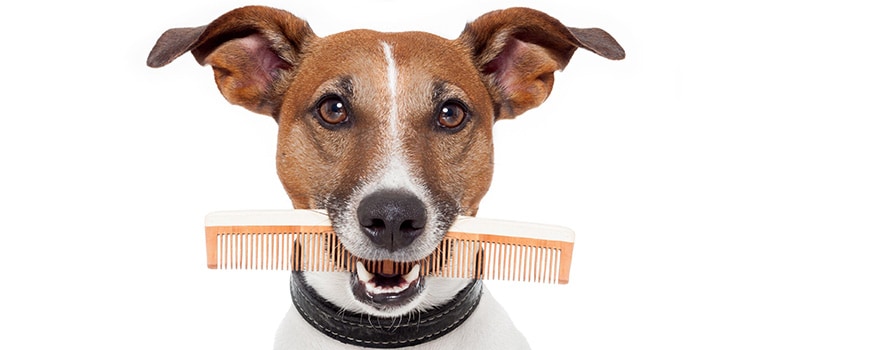You can’t expect your Yorkshire to have long, shiny hair if the hair is growing out of itchy, inflamed skin. More important, your Yorkie is going to be uncomfortable. As your dog’s largest organ, and most visible one, skin, and its problems, are nothing to dismiss.
If your Yorkshire is scratching, chewing, rubbing, and licking, he may have allergies, perhaps to inhaled allergens, or things he comes in contact with, like foods or fleas. Unlike humans, where hay fever and other inhaled allergens typically cause sneezing, in dogs they more often cause itching. Food, too can cause allergies. Signs of allergies, are typically reddened itchy skin, particularly around the ears, eyes, feet, forelegs, armpits, and abdomen. The dog may scratch and lick, and rub his torso or rump on furniture or rugs.
Allergens can be isolated with a skin test, in which small amounts of allergen extracts are injected under the skin, which is then monitored for reactions. Besides simply avoiding allergens, some treatments are available. The most common inhaled allergens are dander, pollen, dust, and mold. They are often seasonal. Signs most commonly appear between 1 and 3 years of age. Treatment includes antihistamines, glucocorticoids, and hyposensitization.
The most common allergy among all dogs is flea injects under the skin whenever it feeds. Not only does it cause intense itching in that area but all over the dog, especially around the rump, legs, and paws. Even a single fleabite can cause severe reactions in allergic dogs. The cure? Get rid of fleas.
Stop The Itch!
Everybody has an occasional itch. But persistent itching, or itching accompanied by vigorous chewing or rubbing, or by inflamed or broken skin, is more than a casual itch. It’s a sign of a skin problem, one that will only get worse. That’s because itching and chewing further damage the skin, creating a swampy welcome center for bacteria to compound the initial problem.
Yorkshires can itch for many reasons, so your best bet is to get your veterinarian’s opinion. Meanwhile, you can try some home treatments. Start simple. Apply an ice pack to the affected area. Or for a larger area, try a cool-water dip, immersing the dog in water for ten minutes. Pat dry, avoiding blow-drying or vigorous rubbing.
Bathing may give better results. But remember, any medicated shampoo must be in contact with the skin for at least ten minutes in order to be effective. And use cool water! Consider these products:
- Colloidal oatmeal products draw inflammatory toxins from the skin, reducing itchiness for up to three days. They come in soaks, shampoos, and creme rinses, with the latter having the longest-lasting effects. Some colloidal oatmeal products are combined with local anesthetics to further sooth the skin.
- Bath oils added to the water may help moisturize overly dry skin.
- Flea shampoos can kill fleas, but if you don’t have a flea shampoo, almost any shampoo will kill them. Just leave it on a little longer.
- Lime-sulfur shampoos are good for drying weeping skin lesions and alleviating itchiness. They also kill some parasites and bacteria. Warning: They smell horrible and can stain fur and clothing!
- Antiseptic soaps and shampoos are effective on broken skin, especially hot spots and puppy impetigo. Even antiseptic mouthwash will help.
After bathing, you may wish to apply one of the following topical sprays or ointments.
- Witch hazel spray or lotion has a cooling effect that may be soothing in some cases.
- Moisturizer sprays or dips can help alleviate the itchiness of overly dry skin.
- Aloe vera contains enzymes that break down inflammatory proteins. Most aloe vera products are mixed with other ingredients that render them less effective and possibly harmful to dogs that lick them off. Pure aloe vera is available from most health food stores.
- Anti-itch sprays and creams for humans can be soothing to dogs. Avoid calamine lotion, though. It can make dogs sick if they lick it off. Always read the labels of any products made for humans because they are not designed for use on an animal that might ingest them. If it says it is poisonous, do not use it unless you can prevent your Yorkshire from licking it.
- Topical steroid sprays and creams can provide fast relief from itching without the untoward side effects of oral steroids.
In severe cases, bathing and topical applications may not be enough to give your puppy relief. Oral drugs and supplements may be helpful.
- Oral antihistamines are commonly prescribed by veterinarians to quell itching. Histamines can cause inflammation in dogs, but not to the extent they do in humans. Thus, antihistamines may not be as effective in dogs. Some may be more effective than others, but finding the correct one usually takes a couple of weeks of trials for each antihistamine. They are likely to cause drowsiness, which may be a desirable side effect in cases of intense itching, but not for long-term use. Commonly used antihistamines are clementine fumarate, diphenhydramine, chlorphenamine, and hydroxyzine. It is extremely important that any over-the-counter antihistamines given to a dog not contain other medications, such as those found in sinus or cold relief medications. Talk to your veterinarian ahead of time to find out the correct dosage for your puppy or adult dog, and keep some in the medicine chest.
- Fatty acid supplementation isn’t a quick solution, but it can provide improvement over the long term. It’s effective in up to one quarter of cases of itchy skin, especially when used in conjunction with antihistamines. Do not confuse these supplements with those sold as food supplements to improve coat quality. Fish oil is one good source of fatty acids.
Finally, try to get your Yorkshire’s mind off the itch. Play some games, go for a walk, or give a treat that requires extensive chewing or working. If the scratching and biting continue, try covering his trunk with a little doggy T-shirt or his feet with doggie booties. An Elizabethan collar, available from your veterinarian and some pet supply stores, can prevent the pup from scratching his face and chewing parts of his body – but he’ll despise wearing it!
If itching continues, take your Yorkshire to the veterinarian for diagnosis and treatment. Severe itching may call for oral cortisone medication. This provides the most immediate and effective relief, and may be necessary in order to stat treating the condition. If your Yorkshire still has skin problems, consider consulting a veterinary dermatologist, which you can locate through the American College of Veterinary Dermatology at www.acvd.org/public/findaderm.

